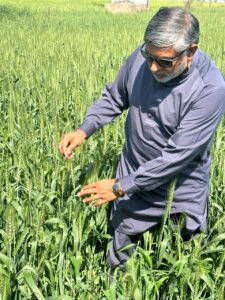
Ghulam Ahmad Pattern-in-Chief APFDA
Climate change refers to long-term shifts in weather patterns and average temperatures on Earth. These changes are primarily driven by human activities such as burning fossil fuels, deforestation, and industrial processes, which increase greenhouse gas emissions, leading to global warming. In Pakistan, the impacts of climate change are profound and varied. They include more frequent and intense extreme weather events such as floods, droughts, and heat waves, altered precipitation patterns affecting agriculture, changes in water availability and quality, loss of biodiversity, and rising sea levels threatening coastal areas.
These impacts pose significant challenges to Pakistan’s economy, agriculture, food security, water
resources, public health, and overall sustainable development. Addressing climate change requires
concerted efforts at the national and global levels to mitigate greenhouse gas emissions, adapt to
changing conditions, and build resilience to climate impacts.
Current and impending climate change impacts, especially on wheat crops, have multifaceted
consequences in Pakistan. Erratic weather patterns, like unpredictable rainfall and heatwaves, pose
significant threats. Droughts can parch fields, reducing wheat yields, while excessive rains lead to
waterlogging and fungal diseases, further compromising harvests. Rising temperatures also facilitate the proliferation of pests, exacerbating crop losses. These challenges highlight the urgent need for adaptive agricultural strategies and resilient crop varieties to ensure food security in Pakistan., Climate change could lead to a reduction in wheat production in the coming years due to factors like excessive rainfall, droughts, and increased temperatures. Additionally, the quality of wheat grains could be affected by uncontrollable rainfall and heat, potentially leading to an increase in pests and diseases. These issues could severely impact agriculture and food quality.

Climate change will likely have significant impacts on Pakistan’s food security. Reduced crop yields due to erratic weather patterns could lead to food shortages and increased prices, affecting the availability and affordability of food for millions of people. Additionally, disruptions in agricultural production may
exacerbate poverty and food insecurity, particularly in rural areas where agriculture is a primary source
of livelihood. Therefore, addressing climate change is crucial for ensuring food security and stability in
Pakistan.
Currently, the Pakistani government is taking several initiatives to address climate change. These
include implementing policies to promote renewable energy sources such as solar and wind power,
enhancing forestation efforts to mitigate carbon emissions, and implementing strategies to improve water resource management in response to changing weather patterns. Additionally, there are programs focused on raising awareness about climate change adaptation and resilience among communities, particularly in vulnerable areas prone to natural disasters. Collaboration with international organizations and participation in global climate change agreements also form a part of Pakistan’s efforts to tackle this issue.
If we look at the observations of the past five years, there has been a continuous series of unseasonal
rainfall. In 2021 for instance, Pakistan witnessed an unusually high amount of rainfall in the month of
April, resulting in significant crop damage. Similarly, in 2021-22, the rice crop suffered severe damage due to excessive rainfall during the rice harvesting season. The lack of proper harvesting led to substantial losses. It’s essential to assess what measures have been taken to address these challenges. Have we implemented any irrigation arrangements to mitigate the effects? Have our research institutions collaborated with the private sector to develop strategies to tackle these current challenges?
To mitigate the challenges posed by climate change in Pakistan, urgent action is needed at the grassroots level. We are currently so ill-prepared that even our natural waterways, which were once abundant with flowing water, have now become depleted. Moreover, the underground water pumps in small towns and villages are causing further damage as there’s no regulation to control their usage. Similarly, the encroachment on small water bodies in villages, which were left during land reform for rainwater collection, has worsened the situation. People have seized these lands, and neither you nor the authorities in small towns are taking any responsibility for their conservation. This not only damages the land but exacerbates the destruction when heavy rainfall occurs. These are issues we could easily address, but the enforcement agencies and local authorities are neglectful. Unfortunately, we couldn’t even tackle these small matters. Similarly, the natural waterways, either occupied by the people or dried up due to population growth, need restoration urgently. Sensitizing the community residing near these water bodies, be it ponds or ditches, and reclaiming them is essential for their restoration. This is crucial so that we can tackle these challenges in the future effectively.
The shift in weather patterns has not yet been thoroughly researched by our research institutions. There hasn’t been any guidance provided to our farmers regarding whether this shift has indeed occurred and what adjustments should be made in their cropping patterns accordingly. When it comes to agricultural extension services, they stick to old practices, advising farmers to sow crops in October, November without considering the increased rainfall observed in March and April. Consequently, when heavy rains occur in March and April, our harvesting of crops like wheat is affected. So far, our research institutions have failed to provide guidance to our farmers. Should they switch to short-duration crops? Should they delay their sowing to December, it’s the responsibility of our research institutions to address these issues.
Moreover, the specific research institutions tasked with conducting such research will also need to look
into it. The four to five crops of wheat that we sow must be transitioned to low duration crops so that the country can adapt to the environmental changes and food security challenges effectively.
In accordance with the current climate change, it is imperative for our leading research institutions to
develop varieties that align with the weather shift. These varieties should have traits such as shorter crop duration, resistance against climate change-induced stress, and increased yield. Similarly, it’s crucial to identify which crops should be shifted in areas where climate change has a significant impact.
Collaboration between our national research institutions and provincial agricultural extension
departments is essential. Both entities need to provide proper guidance to our farmers, highlighting the
ideal sowing times for each crop and their resistant varieties against climate change. Additionally, they
should offer guidance on harvesting and sowing timings to address future challenges in food security and enhance the economic well-being of farmers. Immediate policy action is required in this regard, utilizing Pakistan’s resources, and providing assistance to farmers for its implementation.

